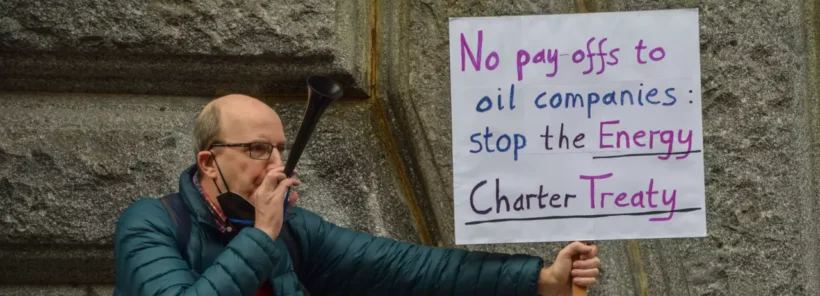Several young victims of the climate emergency plan to file a lawsuit Tuesday in Europe’s top human rights court, where they will challenge an arcane energy treaty that protects fossil fuel investors at the expense of securing a livable planet.
“It’s hard to think of an international treaty that is more out-of-date and out-of-time.”
As The Guardian reported, five plaintiffs between the ages of 17 and 31, all of whom have recently endured disastrous hurricanes, floods, and fires, are trying to persuade the European Court of Human Rights (ECHR) that the 1994 Energy Charter Treaty (ECT) violates the right to life and the right to respect for private and family life—the second and eighth articles, respectively, of the European Convention on Human Rights.
The case marks the first time the ECHR will be asked to consider the ECT, an obscure agreement whose investor-state dispute settlement (ISDS) mechanism enables fossil fuel companies to sue governments over anticipated economic losses stemming from plans to move away from coal, oil, and gas.
“It just can’t be that the fossil fuel industry is still more protected than our human rights,” a plaintiff named Julia, a 17-year-old high school student from Germany, told The Guardian.
Julia decided to join the lawsuit after her hometown was devastated by extreme flooding last July. Torrential rainfall in the Ahr Valley—the intensity of which shocked climate experts, who said that unmitigated greenhouse gas pollution is causing more catastrophic weather earlier than expected—forced Julia and her parents to flee their home and led to floods that killed 222 people across Germany and Belgium.
“That’s why I decided to join this legal action, to fight against the Energy Charter Treaty still protecting the fuel industry,” she said.
The five young plaintiffs are suing a dozen ECHR member states, including France, Germany, and the United Kingdom, because these countries are home to corporations that have invoked the ECT to impede a clean energy transition.
German energy companies RWE and Uniper, for example, are suing the Netherlands for 1.4 billion euros ($1.5 billion) and 1 billion euros ($1.1 billion), respectively, as compensation for the Dutch government’s plan to phase out coal by 2030. Meanwhile, the Italian government is being sued by Rockhopper Exploration for 225 million euros ($237 million) after it reintroduced a ban that prevents the U.K.-based company from drilling an oil field in the Adriatic Sea.
In addition to siphoning off billions of taxpayer dollars that could otherwise be used to fund climate action, the ECT derails more robust decarbonization plans, according to critics.
Given that an estimated 60% of secretive ECT tribunal decisions favor investors, critics say the mere threat of expensive litigation has a chilling effect on climate ambition—prompting states to weaken policies in an attempt to prevent energy companies from claiming that certain measures do not meet the ECT’s ambiguous standard of “fair and equitable treatment.”
The ECT’s so-called “future earnings” clause is particularly impactful, as it protects hundreds of billions of dollars worth of fossil fuel infrastructure.
Doug Parr, chief scientist at Greenpeace U.K., noted that “it’s hard to think of an international treaty that is more out-of-date and out-of-time.”
Last year, Yamina Saheb, a former employee of the ECT secretariat who quit in 2018 to sound the alarm, called the pact “a real threat” to the Paris agreement, which seeks to limit global warming to 1.5ºC above preindustrial levels by century’s end. “It’s the biggest threat I am aware of,” added the whistleblower.
According to Saheb, foreign investors could, under the ECT, sue governments for 1.3 trillion euros ($1.4 trillion) between now and 2050 as reimbursement for the closure of fossil fuel plants. That sum is equivalent to what the E.U. hopesto spend on a green transition this decade, the most pivotal for decarbonization.
The young plaintiffs’ lawsuit coincides with a new letter in which 76 climate scientists warn E.U. leaders that continuing to shield coal, oil, and gas investors under ECT rules would force countries to “choose between keeping the existing fossil fuel infrastructure running until the end of their lifetimes or facing new ISDS claims.”
“Both options will jeopardize the E.U. climate neutrality target and the E.U. Green Deal,” says the letter, which urges the recipients to withdraw European nations from the ECT.
The letter comes as the ECT’s 54 members, stretching from Western Europe through Central Asia to Japan, meet this week to negotiate the “modernization” of the 1994 agreement.
The European Commission, which negotiates on behalf of the E.U.’s 27 member states, has proposed that ECT protections for many existing fossil fuel investments be prolonged through 2040.
Such a slow phaseout, the letter makes clear, would be incompatible with scientific findings demonstrating the need to immediately cease the construction of new fossil fuel infrastructure and urgently shut down many existing sites this decade.
Countries that withdraw from the ECT are still subject to ISDS lawsuits for another 20 years thanks to a “zombie clause” in the agreement.
“We don’t only need to phase out coal and fossil fuels,” Sandra Beckerman, a member of the Dutch Parliament, said last year. “We need to phase out the power that these companies still have, the power that they have over our governments.”
Cover image: A protester holds a placard calling for the abolition of the Energy Charter Treaty during a Global Day of Action for Climate Justice demonstration in London on November 6, 2021. (Photo: Vuk Valcic/SOPA Images/LightRocket via Getty Images)



 By
By
Leave a Reply